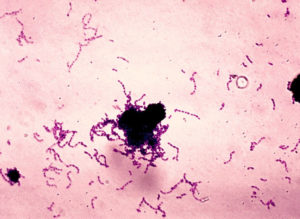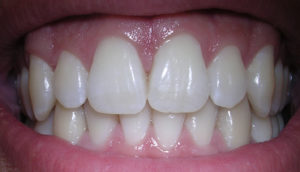 Research shows that Streptococcus mutans, the bacteria that is a main cause of tooth decay or dental caries, is passed from mother to child, and also between nonrelative children. Any interaction that involves saliva, like sharing an ice cream cone or drinking from the same cup or straw as another child, can cause the microbes to be transferred. From Medical Xpress:
Research shows that Streptococcus mutans, the bacteria that is a main cause of tooth decay or dental caries, is passed from mother to child, and also between nonrelative children. Any interaction that involves saliva, like sharing an ice cream cone or drinking from the same cup or straw as another child, can cause the microbes to be transferred. From Medical Xpress:
Research shows sharing of cavity-causing bacteria may not be only from mothers to children
New ongoing research from the University of Alabama at Birmingham Department of Biology and School of Dentistry is showing more evidence that children may receive oral microbes from other, nonrelative children. It was previously believed that these microbes were passed primarily from mother to child, but in a recent study presented at the American Society for Microbiology MICROBE 2016 Meeting in Boston, researchers found that 72 percent of children harbored at least one strain of the cavity-causing Streptococcus mutans not found in any cohabiting family members.
S. mutans is a bacterium that feeds on fermentable carbohydrates, in particular sucrose, that are frequently consumed by humans. After meals, S. mutans produces enamel-eroding acids, which makes S. mutans one of the main causes of tooth decay, or dental caries, in humans.
One hundred nineteen African-American children ages 12-18 months and 5-6 years who lived with at least one family member were a part of the study. The researchers collected samples from children periodically over the course of eight years. Momeni says that dental caries are more prevalent in minorities and low-socioeconomic groups.
"The literature tells us that we usually get this bacterium from our mothers," Momeni said. "This is because we most commonly have more interaction with our mothers when we are very young. However, our data supports that children who interact with other children at school or in nurseries can, and frequently do, contract this bacteria from each other." Momeni says any interaction that involves saliva, like sharing an ice cream cone or drinking after another child from the same cup or straw, can cause the microbes to be transferred.
Forty percent of the children in the study did not share any S. mutans strains with their mothers, and close to 20 percent of children shared these bacteria only with another child who lived in the household, such as a sibling or cousin. It is important to note that, for the strains of S. mutans not shared with anyone in the same household, approximately a third of the children had only a single isolate for a genotype, which could mean these rare strains may have nothing to do with the dental caries, and may be confounding the search for strains associated with the disease.

 The finding that the oral bacteria Streptococcus mutans, which is found in 10% of the population, is linked with hemorrhagic strokes is big. S. mutans is found in tooth decay or cavities (dental caries). The researchers found a link with cnm-positive S. mutans with both intracerebral hemorrhage (ICH) and also with cerebral microbleeds.
The finding that the oral bacteria Streptococcus mutans, which is found in 10% of the population, is linked with hemorrhagic strokes is big. S. mutans is found in tooth decay or cavities (dental caries). The researchers found a link with cnm-positive S. mutans with both intracerebral hemorrhage (ICH) and also with cerebral microbleeds.